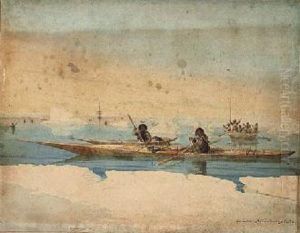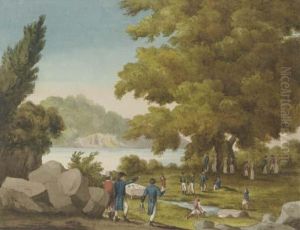George Francis Lyon Lieutenant Paintings
George Francis Lyon was not primarily known as an artist in the traditional sense, but rather as a British naval officer, explorer, and a bit of an adventurer, whose experiences led him to create works that have since been appreciated for their historical and artistic value. Born in 1795, Lyon embarked on a career with the Royal Navy that would see him involved in a series of remarkable expeditions, including attempts to navigate and explore the Arctic and Africa.
Lyon's contributions to the field of exploration were notable. He participated in the search for the Northwest Passage, a legendary and elusive sea route through the Arctic Ocean, connecting the Atlantic and Pacific Oceans. During these expeditions, Lyon documented his travels and experiences through journals and sketches, providing valuable insights into uncharted territories, indigenous cultures, and the harsh realities of exploration in extreme conditions. His artistic output, though not his primary legacy, includes sketches and paintings that capture the essence of the places he visited and the people he encountered. These works are valued not only for their aesthetic qualities but also for their historical significance, offering a glimpse into the environments and cultures of the early 19th century.
Lyon's interest in exploration extended beyond the Arctic. He was also part of an expedition to Africa, specifically to what is now Nigeria, with the aim of establishing closer ties and exploring potential trade routes. His journey into the interior of Africa was fraught with challenges, but it further demonstrated his resilience and determination to uncover new knowledge. Throughout his travels, Lyon maintained a keen eye for detail, which is evident in the drawings and writings he left behind.
George Francis Lyon passed away in 1832, leaving behind a legacy that encompasses the spheres of naval history, exploration, and art. While his primary contributions were in the form of exploration and naval service, the artistic works he produced on his journeys have secured him a place in the annals of history as an individual who not only sought to discover the unknown but also to document it for future generations. His life and work continue to be of interest to historians, geographers, and art historians, who see in Lyon's diverse talents and achievements a compelling story of adventure, discovery, and creativity.

